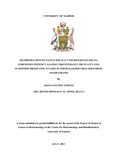| dc.contributor.author | Otieno, Sundy A | |
| dc.date.accessioned | 2013-07-31T07:48:32Z | |
| dc.date.available | 2013-07-31T07:48:32Z | |
| dc.date.issued | 2013-07 | |
| dc.identifier.citation | Degree of Master of Science in Biotechnology in the Centre for Biotechnology and Bioinformatics, , University of Nairobi, 2013 | en |
| dc.identifier.uri | http://erepository.uonbi.ac.ke:8080/xmlui/handle/123456789/52849 | |
| dc.description.abstract | Insect pests contribute to reduced maize grain yield pre and post harvest. They affect
46% of global maize growing area post harvest, 60% of this maize loss occurs in tropical regions. Bacillus thuringiensis has become vital in the pest management strategy, as an insecticide, biopesticide, fungicide and also in transgenic plants. In Kenya maize is the staple food. Prostephanus truncatus and fumonisin producing fungi Fusarium verticil/ioides are prevalent in tropical and sub tropical regions, and are hard to eradicate using pesticides. This study sought to investigate effects of native B. thuringiensis delta endotoxin against P. truncatus and fumonisin producing F. verticillioides. F. verticil/ioides was isolated from maize grains obtained from Makueni district in Kenya. VERT-l (5'-GCGGGAATTCCAAAGTGGCC-3') and reverse VERT-R (5'-
CGACTCACGGCCAGGAAACC-3') which are species specific PCR primers for the
identification of F. verticillioides were used after morphological methods of
identification were carried out. A set of specific primers, VERTF-l, VERTF-2 and Frofum8-
rev were used to analyze the isolated F. verticil/ioides for fumonisin production.
Translation Elongation Factor TEF-la gene was amplified using primers EF-l and EF-2
and the resulting PCR product was used to carry out sequencing for confirmation of
identity of the isolated species. Delta crystals of B. thuringiensis were bioassayed against the F. verticillioides and P. truncantus. Two species of Fusarium (F. verticillioides and F. oxysporum) were isolated from the maize grains from Makueni district, Eastern
province. Sixty five percent of the Fusarium species isolated produced fumonisins. Novel
Bt. Varieties used showed statistically significant differences on their effects on the maize pests, at a confidence level of 0.05. KG 20 showed antagonistic action against P.
truncantus, varieties TEN and ISR showed best results in F. verticillioides control, while
KG 411 was effective against both P. truncantus and F. verticillioides. This study shows
that F. verticil/ioides is naturally present on maize grains in Makueni district; Eastern
province in Kenya and Bt. toxins can be used successfully against both pests. | en |
| dc.language.iso | en | en |
| dc.publisher | University of Nairobi | en |
| dc.subject | Bacil/us thuringiensis, delta crystals, fumonisin, Fusarium, Prostephanus truncatus, Fusarium verticil/joides. | en |
| dc.title | Determination of native bacillus thuringiensis deltaendotoxin potency against prostephanus truncatus and fumonisin producing Fusarium Verticillioides isolated from maize grains | en |
| dc.type | Thesis | en |
| local.publisher | College of Biological and Physical Sciences | en |

